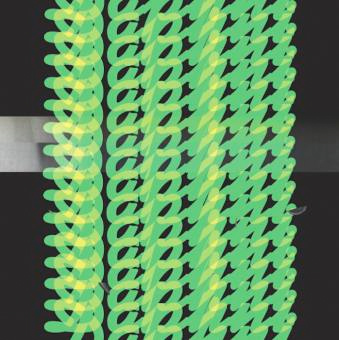Caribou and Four Tet have often invited comparison. Recently, though, it’s almost as if they’re following the same cue sheet. Canadian Dan Snaith’s new Daphni project mirrors Londoner Kieran Hebden’s recent shift towards the dancefloor with scary accuracy: both were auteurish producers flirting with dance forms but twisting them to home-listening ends; both, last year, began to address their passion for dance music head on with a series of limited-pressing 12"s; both have now collated their productions into LPs, perhaps drawing a line under a fertile period of experimentation where the possibilities inherent in the house music form suddenly seemed manifold.
Like Hebden, Snaith’s forays into house music are astute, incisive and not remotely dilettantish – in fact, he seems to understand the skewed mechanics of groove, the beautiful paradox at the heart of the phrase "machine funk", far better than many of his more purist contemporaries. But where Kieran Hebden’s recent Pink exploited structures that unfolded glacially, sculpting poised loops and quietly disjointed percussive patterns into a long-form, low-impact epic, Snaith clearly has instant gratification in mind. And as a result, where Hebden’s sonic objects can be picked over, luxuriated in, meditated upon as they drift implacably in and out of focus, Snaith’s rear up out of the murk like unchained beasts. Pink was danceable, yes, but in a subdued sort of way; Jialong is a full-on, sweat-dripping-off-the-ceiling basement banger of an album.
The intensity hits maximum right from the opening: ‘Yes I Know”s looped funk samples, bolted onto a robust four-four, detour through soupy reverbs and half-baked breakdowns, swelling and receding erratically, building and building without ever crashing down onto the bedrock of some unifying resolution. As a narrative it ought to be deeply frustrating, but in fact it’s quite the opposite – a subversion of standard dancefloor dynamics which recurs repeatedly on this album and moves well beyond arch commentary or contrarian posturing.
Snaith has described the Daphni project as a (not so) controlled collision of the acoustic and the synthetic, and that dialogue is evident throughout Jiaolong, where raucous breakbeats and chunks of fossilised vocal are paired off against an atavist drum machine thump and bubbling, pearly daubs of synth. More often than not, though, it’s the latter that wins out: take Snaith’s remix of Cos-Ber-Zam’s ‘Ne Noya’, whose ramshackle percussive loop becomes a vehicle for thick, intoxicating synth runs that hover densely in the air for what feels like an age; or ‘Pairs’, a funky number rendered alien by martial, Plastikman-like snare rolls and the odd cloud of artificial reverb.
In an age of hyper-optionality these tracks are never festooned with excessive detail where a few stark gestures would do, and the results boil over with primitive playfulness: ‘Jiao’, whose tangy bassline and modal noodling is definite peak time fever material; ‘Light’, even better, its gleaming flute-like melodic figure and viscous kosmische bloops serving as counterpoise to a bassline whose resonant overtones occasionally screech obnoxiously down the frequency range; ‘Springs’, better still, a collage of B-movie laser gun synth stabs and loose-limbed tom rolls that takes a left turn into the spartan drum machine territory mapped out by Pearson Sound – except the way the bass capriciously gloops and squeals its way along suggests that control is always at one remove from Snaith himself, lurking somewhere in the machines. These tracks manage to be simultaneously jacking and nimble, screwfaced and prim. Heard on headphones on the morning commute they probably won’t make much sense – picture the fleshy melee of Plastic People, though, and things will start to click.
The album’s less convincing moments come when Snaith settles in for a lengthier workout. ‘Ye Ye’ and ‘Ahora’ in particular certainly don’t lack proficiency, but in playing the long game the perverse erraticism that makes this album such a singular proposition is sacrificed. Closer ‘Long’ is similarly more mannered, and the album’s only concession to a more introspective mood; still, the marvelously tactile sensation of machines rubbing fractiously up against each other, ungainly sonic phenomena vying for attention, just-slightly careless hands resting on chunky faders, is present and correct. Our man is on to something here.


